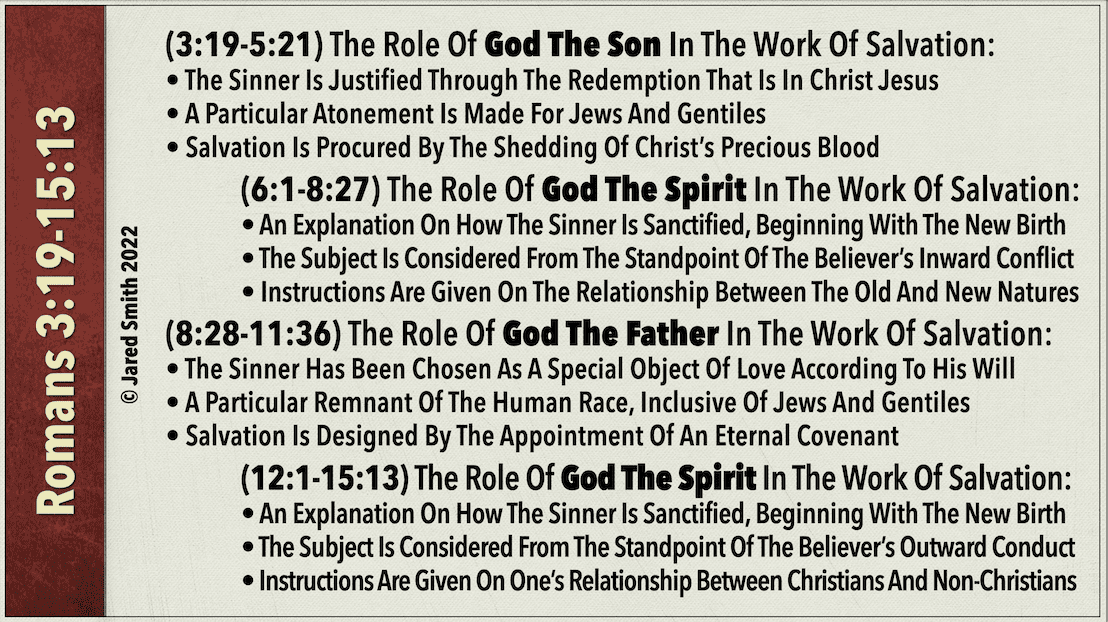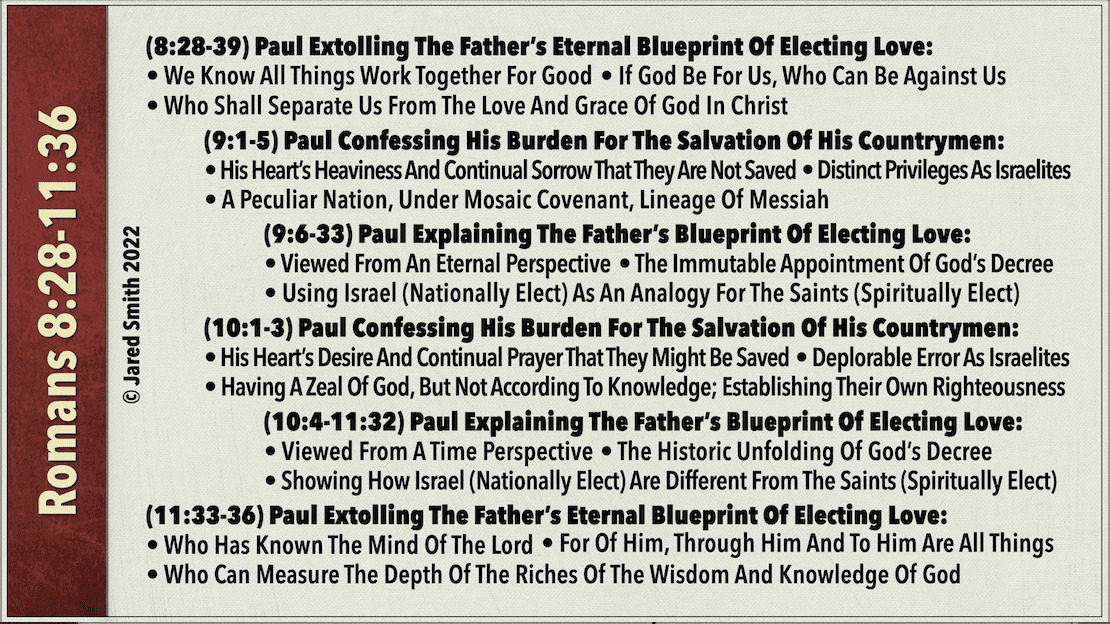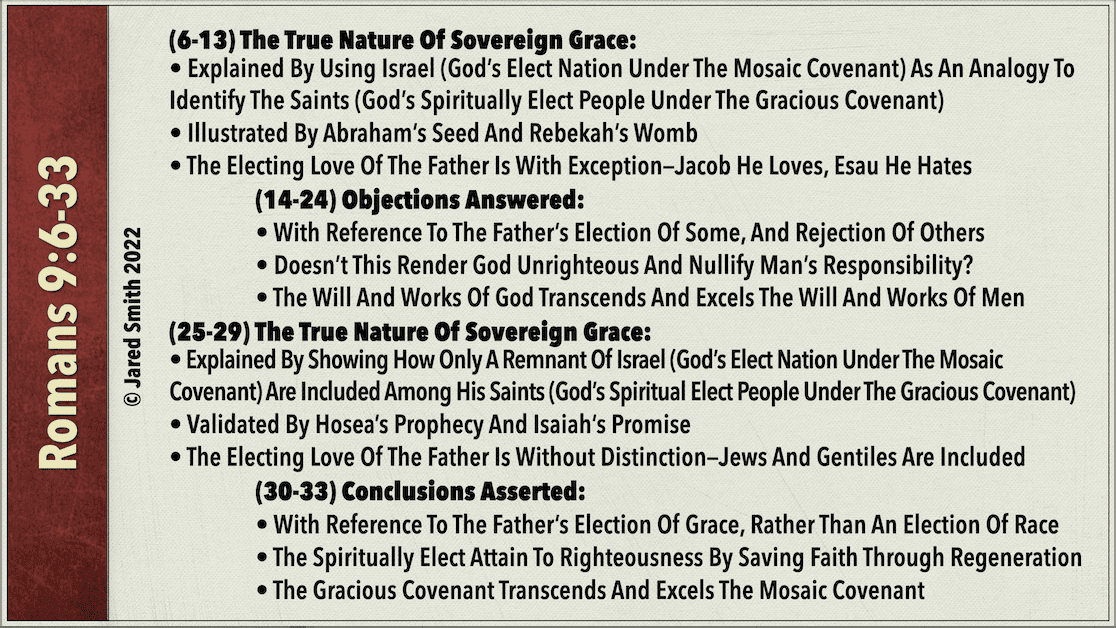19 Bible Doctrine – How Does Paul’s Analogy Of A Potter And The Clay Fit Within The Context Of Romans 9 As A Whole?
A Transcript Of The Video Study
In our previous study, we considered the Father’s role in the work of salvation, explained by Paul in Romans 8:28-11:36.
You will remember, there are six parts to this section of the letter:
In (8:28-39), Paul extols the Father’s eternal blueprint of electing love; in (9:1-5), he confesses his burden for the salvation of the Jews; in (9:6-33), he explains the Father’s eternal blueprint of electing love; in (10:1-3), he once again confesses his burden for the salvation of the Jews; in (10:4-11:32), he once more explains the Father’s eternal blueprint of electing love; and in (11:33-36), he ends where he began, extolling the Father’s eternal blueprint of electing love.
Now, the analogy of a potter and the clay fits into the context of the third section—(9:6-33) Paul’s explanation of the Father’s eternal blueprint of electing love. In these verses, he views the masterplan of God from an eternal perspective, focusing his attention on the immutable appointment of God’s decree. And of course, he not only distinguishes the nationally elect people (Israel) from the spiritually elect people (the saints), but he also uses Israel as an analogy to describe the saints.
Well, this brings us to the subject of our current study—how does Paul’s analogy of a potter and the clay fit within the context of Romans 9 as a whole? To answer this question, we must once again search out the structure of the passage.
There are four main sections to these verses:
In (9:6-13), Paul begins with a statement on the true nature of sovereign grace. Remember, he is speaking about the role of the Father in the work of salvation, which he explains by using Israel (God’s elect nation under the Mosaic Covenant) as an analogy to identify the saints (God’s spiritually elect people under the gracious covenant). This explanation revolves around two illustrations—Abraham’s seed and Rebekah’s womb.
In (9:6-9), the electing love of the Father is illustrated by Abraham’s seed—Romans 9:6-9: “Not as though the word of God hath taken none effect. For they are not all Israel, which are of Israel: neither, because they are the seed of Abraham, are they all children: but, In Isaac shall thy seed be called. That is, They which are the children of the flesh, these are not the children of God: but the children of the promise are counted for the seed. For this is the word of promise, At this time will I come, and Sara shall have a son.” Of this man’s seed, he had two sons—Ishmael, by Hagar, and Isaac, by Sarah. However, the blessing was given to Isaac and withheld from Ishmael—“Neither, because they are the seed of Abraham, are they all children: but, In Isaac shall thy seed be called.” Paul uses this as an analogy to illustrate the electing love of the Father under the terms and promises of the gracious covenant. Here, allow me to align the teaching with the framework of sovereign grace—(1) Abraham’s seed represents the whole mass of the human race; (2) The two sons represent two groups of the human race—Ishmael represents the non-elect, the children of the flesh; Isaac represents the elect, the children of the promise; (3) Hagar, the mother of Ishmael, represents the covenant of works under which the non-elect are forever subject, whereas Sarah, the mother of Isaac, represents the covenant of grace under which the elect will be forever subject. And so, this is the first illustration of the true nature of sovereign grace—that of Abraham’s seed.
But then, in (9:10-13), the electing love of the Father is illustrated by Rebekah’s womb—Romans 9:10-13: “And not only this; but when Rebecca also had conceived by one, even by our father Isaac; (for the children being not yet born, neither having done any good or evil, that the purpose of God according to election might stand, not of works, but of him that calleth;) it was said unto her, The elder shall serve the younger. As it is written, Jacob have I loved, but Esau have I hated.” Now you see, Paul uses this as another analogy to illustrate the electing love of the Father under the terms and promises of the gracious covenant. Allow me to align the teachings with the framework of sovereign grace—(1) Rebekah’s womb represents the whole mass of the human race; (2) The two sons represent two groups of the human race—Esau represents the non-elect; Jacob represents the elect.
Now notice, this choice between Esau and Jacob, or between the non-elect and the elect, was predicated, not on the grace or wrath of God, but rather, on His love and hate—Romans 9:13: “As it is written, Jacob have I loved, but Esau have I hated.” It should be understood, the Greek term translated hate doesn’t always involve hostility; sometimes it refers merely to loving something less than something else. For instance, in Luke 14:26, when Jesus said, ”If any man come to me, and hate not his father, and mother, and wife, and children, and brethren, and sisters, yea, and his own life also, he cannot be my disciple”, He did not mean that we must be hostile against our family relations. Rather, He simply meant that we must love Him more than them, and thus the word hatred was used by Christ as a measure of less love. The same Greek term is used by Paul in Romans 9:13, and it means precisely the same thing. When the Father distinguished between the elect and the non-elect at this point in His decree, He simply chose to love the elect more than the non-elect—there was absolutely no hostility involved with the choice. The one are special objects of His love; the other are objects of less love.
Also notice, the reason there is no hostility involved in the Father’s choice, is because at this point in His decree, He viewed the human race as a pure mass of humanity, without consideration of any virtue or vice in them. This is why Paul points out in Romans 9:11: ”For the children (human race) being not yet born (brought into existence), neither having done any good or evil (viewed by the Father as a pure mass of humanity), that the purpose of God (the Father) according to election might stand, not of works, but of him that calleth.” Now, this aspect of the Father’s electing love is sometimes identified by a very strange label—Supralapsarianism. I am only introducing the term at this time, as I hope to bring a dedicated teaching on the subject for our next study. The Latin word “lapsare” means to fall, and the prefix “supra” means before—Supralapsarian means, “before the fall”. In refers to the order of the Father’s eternal decree, wherein, before determining how the human race would be brought into existence, He envisioned the entire mass of the human race without any consideration of sin, out from which He set some apart as special objects of His love, setting the others aside as objects of less love. Only then, after making this choice, did the Father determine how the human race would be brought into existence—into the world and subject to a time continuum, and under the authority of the covenant of works. Now, as I’ve said, I will have more to say about this matter in our next study, but at least you are now familiar with the term supralapsarianism and its basic meaning.
Well, this is what Paul teaches in (9:6-13). He explains the electing love of the Father by using two illustrations—Abraham’s Seed and Rebekah’s Womb. And so, in these verses, the Apostle Paul underscores the electing love of the Father is with exception—Jacob (or the elect) He loves, but Esau (the non-elect) He hates, or loves less. We come now to the next section of the chapter:
In (9:14-24), Paul answers a couple of objections he suspects some will bring against his teachings. These objections are with reference to the Father’s election of some, and rejection of others. First, doesn’t this teaching render God unrighteous, and Second, doesn’t this teaching nullify man’s responsibility?
Let’s consider the first objection, recorded in (9:14-18). Looking again at the framework of sovereign grace, the objection goes something like this: If the Father sets His special love upon some (the elect), but doesn’t extend the same measure of love to others (the non-elect), then doesn’t this render God unrighteous for not loving everyone the same—Romans 9:14-18: “What shall we say then? Is there unrighteousness with God? God forbid. For he saith to Moses, I will have mercy on whom I will have mercy, and I will have compassion on whom I will have compassion. So then it is not of him that willeth, nor of him that runneth, but of God that sheweth mercy. For the scripture saith unto Pharaoh, Even for this same purpose have I raised thee up, that I might shew my power in thee, and that my name might be declared throughout all the earth. Therefore hath he mercy on whom he will have mercy, and whom he will he hardeneth.” No, says Paul. God is not unrighteous for loving some more than others. It is His prerogative and good pleasure to love whomever He chooses to love. He will have mercy on the objects of His special love, but He will harden the objects of less love.
This brings us then to the second objection, recorded in (9:19-24). If the Father will have mercy only on the objects of His special love, and if He hardens the objects of less love, then doesn’t this nullify the responsibility of man? How can people be held accountable for their sins, if it is God who hardens their hearts—Romans 9:19-24: “Thou wilt say then unto me, Why doth he yet find fault? For who hath resisted his will? Nay but, O man, who art thou that repliest against God? Shall the thing formed say to him that formed it, Why hast thou made me thus? Hath not the potter power over the clay, of the same lump to make one vessel unto honour, and another unto dishonour? What if God, willing to shew his wrath, and to make his power known, endured with much longsuffering the vessels of wrath fitted to destruction: and that he might make known the riches of his glory on the vessels of mercy, which he had afore prepared unto glory, even us, whom he hath called, not of the Jews only, but also of the Gentiles?” It is here Paul chooses the analogy of a potter and the clay, to answer this objection against the electing love of the Father. Well, now is not the time to enter into a fuller explanation of Paul’s answer to these objections. However, I plan on returning to these verses (14-24) in an upcoming study when we will consider them in more detail. For now, allow me just to mention that in these verses Paul is essentially arguing the will of works of God transcends and excels the will and works of men. Let’s look then, at the next part of the chapter.
In (9:25-29), Paul returns to the true nature of sovereign grace, only this time he explains it by showing how only a remnant of Israel (God’s elect nation under the Mosaic Covenant) is included among His saints (God’s spiritually elect people under the gracious covenant). This he validates by calling upon two witnesses from the Old Testament—Hosea’s Prophecy and Isaiah’s Promise. In these verses, he is showing that although the nation of Israel ceases to exist, and the Mosaic Covenant is brought to an end, yet God has not cast away the Jewish people as individuals. The electing love of the Father is without distinction—He has chosen as special objects of His love men and women belonging to all races and nations of the world. There are Jewish men and women and there are Gentile men and women who are included under the terms and promises of the gracious covenant.
In (9:25,26), we have the prophecy of Hosea—Romans 9:25,26: “As he saith also in Osee, I will call them my people, which were not my people; and her beloved, which was not beloved. (Hosea 2:23) And it shall come to pass, that in the place where it was said unto them, Ye are not my people; there shall they be called the children of the living God. (Hosea 1:10)”
And then, in (9:27-29), we have the promise of Isaiah—Romans 9:27-29: “Esaias also crieth concerning Israel, Though the number of the children of Israel be as the sand of the sea, a remnant shall be saved: for he will finish the work, and cut it short in righteousness: because a short work will the Lord make upon the earth. (Is 10:22,23) And as Esaias said before, Except the Lord of Sabaoth had left us a seed, we had been as Sodoma, and been made like unto Gomorrha. (Is 1:9)”
What Paul is driving at is this—Israel was distinguished as a special nation by God, made subject to the Mosaic Covenant. God designed the nation to serve as, (1) a repository for the scriptures; (2) the lineage through which the Messiah would be born; (3) a house of gospel witness in the edifices and ordinances of the tabernacle and the temple; (4) a parable of the saints (spiritually elect) and the gracious covenant. The nation of Israel served these purposes for 1500 years, from 1491 BC under the leadership of Moses to AD 70 with the destruction of Jerusalem. You see, the fourfold purpose of the nation had been fulfilled once Christ came into the world, accomplishing the work of redemption. Henceforth, the Jewish people as a nation are no longer a distinguished people in the world. However, this doesn’t mean that all Jewish people as individuals are therefore cast aside by God. No, no! Not at all! Paul is teaching that if a Jewish man or woman is to be saved, then it will be the result of becoming a recipient of God’s grace under the terms and promises of the gracious covenant, rather than being born into the Jewish race under the terms and promises of the Mosaic Covenant. Salvation has never been based on one’s race, nor has it ever been according to the terms and promises of the Mosaic Covenant. Rather, salvation has always and only been based on God’s grace, and it has always been according to the terms and promises of the gracious covenant. This is the point Paul is driving at in these verses.
Well, this brings us to the final section of the chapter. Looking back at (9:14-24), Paul was answering objections against the electing love of the Father; but now, in (9:30-33), he is asserting several conclusions based on the foregoing teachings. In (9:14-24), the objections were with reference to the Father’s election of some, and rejection of others; but here, in (9:30-33), the conclusions are with reference to the Father’s election of grace, rather than an election of race. In essence, the spiritually elect attain to righteousness by saving faith through supernatural regeneration, whereas national elect Israel have erred by attempting to attain righteousness through the works of the Mosaic Law by natural generation. Henceforth, the gracious covenant transcends and excels the Mosaic Covenant—Romans 9:30-33: “What shall we say then? That the Gentiles, which followed not after righteousness, have attained to righteousness, even the righteousness which is of faith. But Israel, which followed after the law of righteousness, hath not attained to the law of righteousness. Wherefore? Because they sought it not by faith, but as it were by the works of the law. For they stumbled at that stumblingstone; as it is written, Behold, I lay in Sion a stumblingstone and rock of offence: and whosoever believeth on him shall not be ashamed.”
And so, my friends, this is Paul’s teaching on the electing love of the Father in Romans 9. As you see, the analogy of a potter and the clay fits within this chapter, and in particular, within the context of Paul answering two objections many people bring against the Father’s electing love. Now, as I have said, in our next study, I will be dealing with the subject of supralapsarianism. I believe it is an important aspect of the Father’s electing love and we should therefore attain an understanding of it before moving forward in our series of studies. And then, in the study thereafter, we will look again at Paul’s answer to these objections, where we will be able to see more clearly why he used the analogy of a potter and the clay. Now, if you plan on joining me again for these upcoming studies, may I encourage you to study Romans 9 for yourself, comparing the notes I have given in this study with your own understanding of the passage? Until we meet again, I pray the Lord will continue to grow you in grace and that you will rejoice in your walk with Him.
Jared Smith served twenty years as pastor of a Strict and Particular Baptist church in Kensington (London, England). He now serves as an Evangelist in the Philippines, preaching the gospel, organizing churches and training gospel preachers.
Jared Smith's Online Worship Services
Jared Smith's Sermons
Jared Smith on the Gospel Message
Jared Smith on the Biblical Covenants
Jared Smith on the Gospel Law
Jared Smith on Bible Doctrine
Jared Smith on Bible Reading
Jared Smith's Hymn Studies
Jared Smith on Eldership
Jared Smith's Studies In Genesis
Jared Smith's Studies in Romans
Jared Smith on Various Issues
Jared Smith, Covenant Baptist Church, Philippines
Jared Smith's Maternal Ancestry (Complete)








